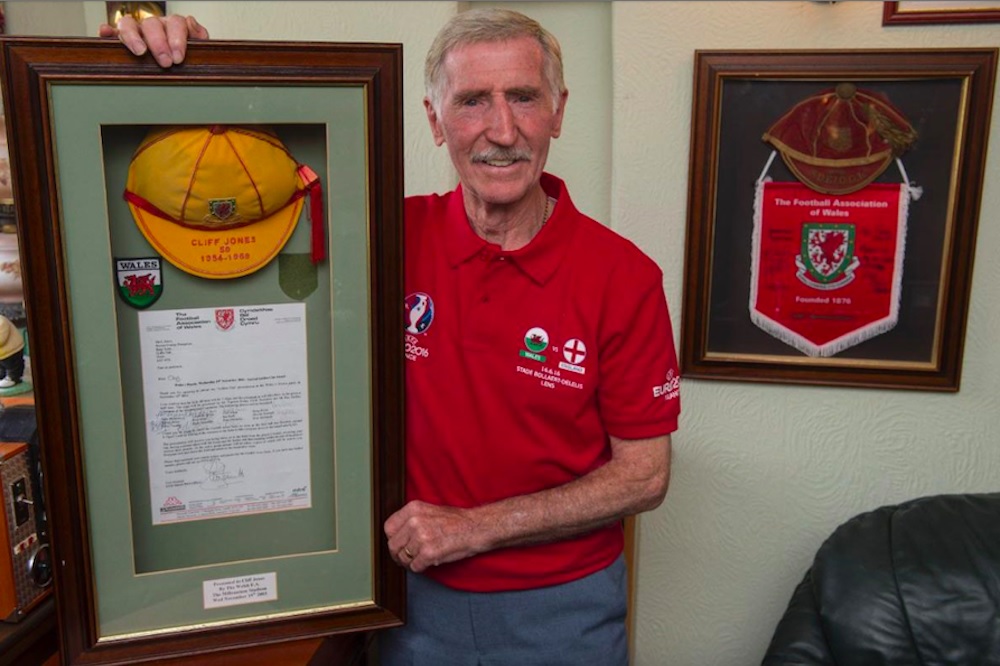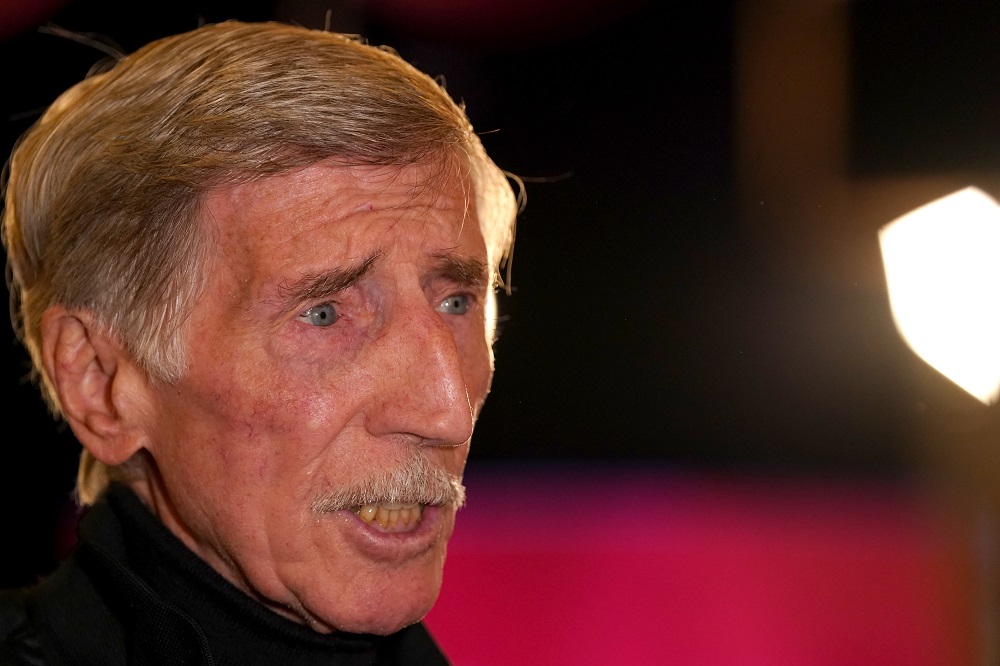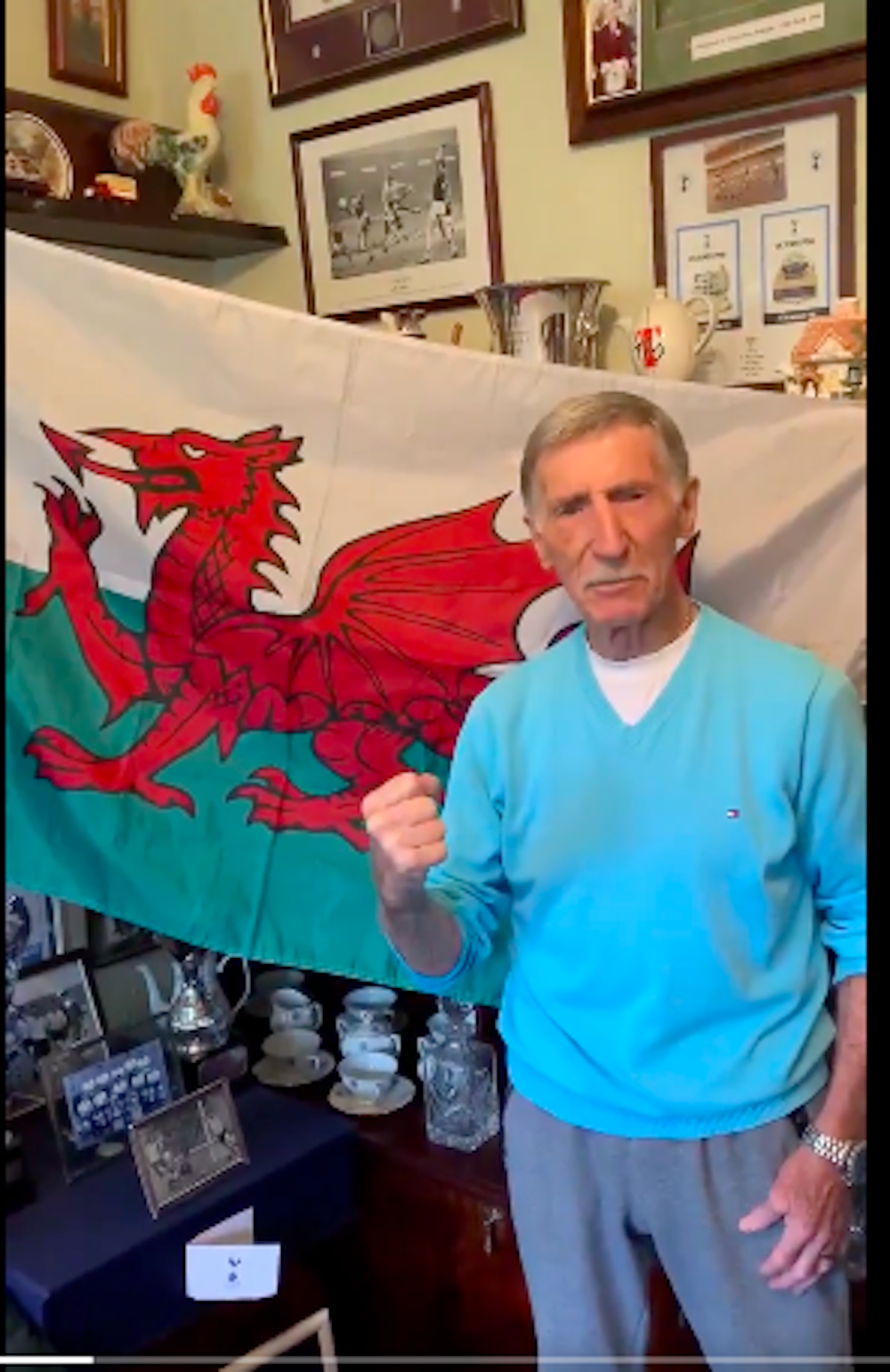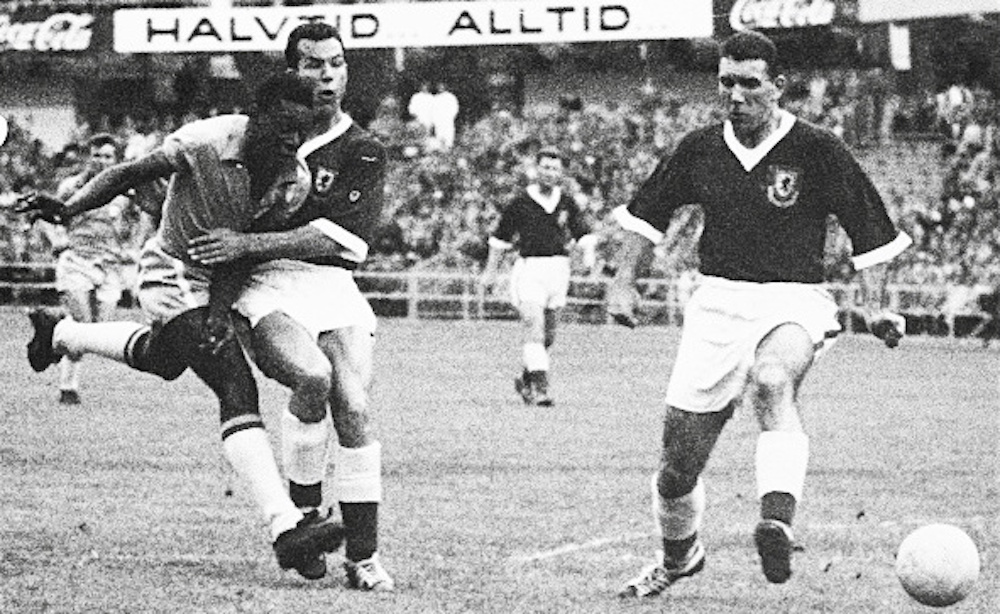Cliff Jones at 90. Happy birthday to one of Wales’ greatest footballers

Leon Barton
For some reason, Swansea-Neath tends to be overlooked when the UK media looks at areas that have produced a lot of footballers. South London, Newcastle, Merseyside and Glasgow are the places that usually get the most attention when fertile footballing areas are discussed.
This has always seemed a strange oversight to me when you look at the output of the area.
The 1990’s were the birth-decade of current 50+ cap internationals Ben Davies (Neath), Connor Roberts (Crynant) and Joe Rodon (Llangyfelach). Between 1945 and 1970 the likes of Leighton James (54 Welsh caps), Jeremy Charles (19), Brian Flynn (66), Leighton Phillips (58), Gary Sprake (37), Chris Coleman (32), Carl Harris (24), Andy Melville (65) and Robbie James (46) were all born in, or within a ten mile radius, of Swansea.
But it’s the years from 1929 to 1935 which was the most fertile period for Swansea footballing births with John and Mel Charles (38/31 Welsh caps), Ivor and Len Allchurch (68/11), Jack Kelsey (41), Terry Medwin (30) and a man born 90 years ago today on Beach Street in the Sandfields area of the city (then town) all emerging then.
With the death of Terry Medwin last year at the age of 91, 59 cap Cliff Jones is now the last man standing of that quite extraordinary generation of Swansea footballers.
Jones was not just an exceptional winger, he was also a winner, with the trophies to prove it. And he wasn’t just a footballer – he’s a hugely charismatic character, an alcoholism survivor, a family man with an incredibly long marriage to boast of.
He is also part of a footballing dynasty. His father Ivor was from Merthyr Tydfil, one of five boys, all of whom were talented footballers.
Uncle Bryn went on to have the most success, winning 17 Welsh caps and starring for Wolverhampton Wanderers in the 1930s before moving to Arsenal in 1939 for a record fee of 14,000.
Uncle Bert was considered perhaps the most talented of the lot but when the Second World War broke out he was sent to Burma with the South Wales Borderers. Unfortunately, he never returned, being killed in action.
Although he only won ten caps, Ivor can at least claim the distinction of being Swansea Town’s first Welsh international.
Cliff was born nearly a decade after his father won his final Wales cap, so never got to see him play. He shared some thoughts on his father’s footballing prowess in his 2016 autobiography ‘It’s a Wonderful Life’:
‘By all accounts my dad was a lovely ball player, very smooth in possession and a natural schemer who could pick a pass and then place it on a sixpence. Strong and stockily built, he didn’t score too many goals but he created plenty for others… reporters of the day were mostly very complimentary about Ivor’s clever play, though I read one account where he was criticised for attempting more than he could hope to achieve single-handedly. That might be translated as hanging on to the ball too long and my only comment on that would be: Like father, like son!’.

For Cliff, ‘my game was all about running with the ball’ and it was that way from the start. First kicking a ball on the Swansea beaches a short walk from his Sandfields home, he quickly learned that if he passed, it would very likely be a long time before he saw the ball again.
Those skills honed on the sand obviously served him well, as he was first picked for the Swansea schoolboy team at the age of 12. In 1950, aged 15, he captained the team when they won the English schools Cup defeating Manchester schools 1-0 at Maine Road following a 1-1 draw at the Vetch in the first leg. A career as a professional loomed.
Despite interest from the likes of Bolton Wanderers, Aston Villa and Wolverhampton Wanderers, Cliff signed for the Swans, much to the delight of his family.
‘My father had no other skills after he retired and finished working in the local steelworks in Cwmfelin. He had said to me ‘you need to learn yourself a trade son’. So I started a five-year apprenticeship as a sheet metal worker over the Prince of Wales Dry Dock’.
Debut
In October 1952, Jones made his Swans debut as a 17 year old in a Division 2 fixture against Bury at Gigg Lane but was in and out of the Swansea midfield for the following year. On Boxing day 1953, in a 2-2 draw against Stoke City on a muddy Vetch pitch, Jones was picked to play left wing for the first time. Harry Griffiths was the right winger, Len Allchurch was at inside right, Mel Charles lead the line and, ‘best of all, the scintillating Ivor Allchurch next to me at inside-left’. Welsh internationals all (although Griffiths only won one cap, in 1953). It seemed he’d found his position and he then became a fixture in the side.
With so many Wales players around him at Swansea it wasn’t long before international honours arrived.
His debut did not go well though. Up against a crack Austria side in Vienna, the young winger was unable to make any impression in a brutal encounter, the home side winning 2-0.
The next time the Wales squad was announced, Jones was absent.
Back at the Swans was form was good though and his consistently eye-catching displays weren’t going unnoticed by Wales.

The October of 1955 was a significant month for Jones. On the 3rd he married Joan at St James’ Church in Uplands, Swansea and he was recalled to the Wales squad for the match against England at Ninian Park on the 22nd. This was to prove a much happier occasion than his debut. Despite forgetting his boots in Swansea and Joan having to make a mad dash to Ninian Park to get them to him on time, Jones scored with a pinpoint header to put Wales 2-0 up just before half time. And although England pulled one back in the Second half, the team hung on for a first Welsh victory over England for 17 years, Jones’ uncle Bryn netting one of the goals on that particular occasion.
‘On the Monday morning after scoring the winning goal against England at Ninian Park, I clocked on at 7:30am. As I walked in, all my workmates were there and they gave me a massive cheer. It was an unbelievable moment, something I’ll never forget. Then I was met my Dai Vaughan, my foreman, who greeted me with: ‘Well done on Saturday Cliff but now there’s your tools, you’ve got a proper job of work to do. Get on with it!’
From then on Jones was a regular in the Welsh team for the next thirteen years. But he was becoming increasingly unsure if he would be able to realise his ambitions of playing in the top flight if he stayed with Swansea.
February 1958 was to also prove a very significant month, both in a club and country context. With Israel’s Arab neighbours refusing to play them, FIFA decided they would have to face off against one of the European nations who’d finished second in their World Cup qualifying group. Wales were given a second chance after having their name drawn out of a hat. Wales eased to a 4-0 two-legged victory, winning 2-0 home and away. The national team would be off to the World Cup in Sweden that summer.
After 176 games and 49 goals for the Swans, having become a regular for Wales the Swans were in no better position than they were when Jones came into the team. It was time to move on.
Tottenham Hotspur
Arsenal were heavily linked. Jones’ Welsh teammates Jack Kelsey and Dave Bowen were at Highbury. Manchester United too, the club being desperate for quality recruitments following the Munich disaster and Wales manager Jimmy Murphy being in charge as Matt Busby recovered (Busby had been so badly injured in the crash that he had actually been read the last rites as he lay in a Munich hospital)
But Swansea’s manager Ron Burgess was a former Spurs great who played alongside their then manager Bill Nicholson when Spurs won the league in 1951. The two men were close with Nicholson considering Burgess one of the greatest players to play for Tottenham. Burgess insisted that if Jones was to leave the Swans it should only be to sign for Spurs.
Chelsea then came in too, offering Jones a hefty (illegal) signing on fee. The 23 year old was tempted by the thousands on offer but was persuaded by pretty much everyone around him that going back on his word to sign for Spurs was the wrong course of action.
Moving to Tottenham was the making of Jones as a footballing superstar and he settled in without any issue. It helped that Welsh teammates Mel Hopkins and Terry Medwin were neighbours in Palmers Green. Cliff and Joan stayed in that same house that Spurs found for him for 25 years, raising their four children there.
The 35,000 fee was a record for a transfer between British clubs but Jones took it in his stride, playing ten games towards the end of the 1957/58 season as Spurs finished 3rd in the league.
Then it was off the World Cup in Sweden, Jones playing every minute of the draws with Sweden, Hungary and Mexico, the 2-1 play off victory over Hungary, and the narrow quarter final loss to Brazil. The goalscorer that day being a 17 year old kid called Pele.

Following the Swedish adventure, Jones’ first full season was an unexpectedly poor one for Tottenham, the club finishing 18th in the league and getting knocked out of the FA Cup in the 5th round. Changes were needed but Bill Nicholson was not a manager who was ever afraid of making them and Jones considers Nicholson’s purchase of Dave Mackay from Heart of Midlothian in 1959 as the key moment in turning a very good team into a truly great one.
A few weeks later Spurs took a post-season trip to the USSR to play Dynamo Kiev, Torpedo Moscow and a Soviet Select XI. The games were hard fought but it was away from the pitch that provided a pivotal moment for Nicholson. The players were – reluctantly – taken to the Bolshoi ballet. Impressed by the suppleness and explosive movements of the male ballet dancers, Nicholson made enquiries into their training and conditioning and on finding out that they used weight training, he brought in an ex-RAF instructor to train his players in a similar manner to the ballet dancers.
The result? ‘We took off the next season’. For Jones, this was an example of ‘Bill’s foresight…looking forward, changing things. He was the main man’.
The 1960/61 season was the greatest in Spurs’ history, winning the league and FA Cup to become the first team of the Twentieth century to ‘do the double’
Jones played 35 games, scoring 19 goals. ‘I very rarely passed it, as Danny Blanchflower never tired of telling me, often in the most colourful language imaginable!’
‘It would send an electric shock through my system when I took possession and I could hear the fans murmur in expectation’
Tragedy
Possibly the best goalscorer around Jimmy Greaves then joined, making a great team even greater, although a second league title was to prove elusive. The FA Cup was won again in 1962 though and the following season saw Spurs become the first UK team to win a major European honour when they secured the European Cup Winners Cup.
Unlike Tottenham though, Wales were having a hard time of things in the 1960s, unable to reach the World Cups in 1962 or 1966.
For both Jones and Spurs tragedy was just around the corner. The brilliant Scottish inside-forward John White was killed by a bolt of lightning in 1964 whilst sheltering on a golf course. Jones describes White as ‘my best friend in football’ and his untimely death as the beginning of the end of Spurs’ glory glory days.
Another FA Cup medal was acquired in 1967 although Jones didn’t actually play in the game. He’d become a more peripheral figure by that point.
In the autumn of 1968, after 372 games and 159 goals, Jones left his beloved Tottenham to join Fulham, then being managed by Bobby Robson. But the club were relegated to Division 3 and after only playing a handful of games the following season, retirement beckoned in 1970.
Post retirement from football, the family stayed in the same Palmers Green house that Spurs had found him in 1958, whilst Jones took up a new career as a PE teacher in Highbury London. It was a job he loved and stayed in for thirty years. Of course, there were never any doubts as to his footballing abilities but Jones took particular pride in his brilliance at badminton.
He came very close to losing his job in the mid-Eighties though when his drinking spiralled out of control. Christmas of 1984 was the nadir, kicking a tray out of his brother Bryn’s hands and shouting and swearing at him.
A desperate Joan asked Jimmy Greaves to talk to him that New Year. Greaves, having been sober since 1978 extolled the virtues of going to AA meetings and after a few months the penny dropped; ‘at last I saw the way forward, the way to save my life as something worthwhile’. He last had a drink on 29 June 1985, meaning 2025 doesn’t just mark Jones’ 90th birthday, it’s also his platinum wedding anniversary, and fortieth year of sobriety.
Despite the tragic death of daughter Deborah from breast cancer in 2006, Jones seems to have been able to enjoy his retirement and long marriage to Joan.
‘I look on myself as one of the luckiest men in the world’.
He’s also one of the greatest sportspeople Wales has ever produced.
378 appearances, 159 goals.
Happy 90th birthday to Spurs legend @Cliff_Jones11! 🎉 pic.twitter.com/6n6QeBlWII
— Tottenham Hotspur (@SpursOfficial) February 7, 2025
Support our Nation today
For the price of a cup of coffee a month you can help us create an independent, not-for-profit, national news service for the people of Wales, by the people of Wales.






Legend, happy birthday Cliff.